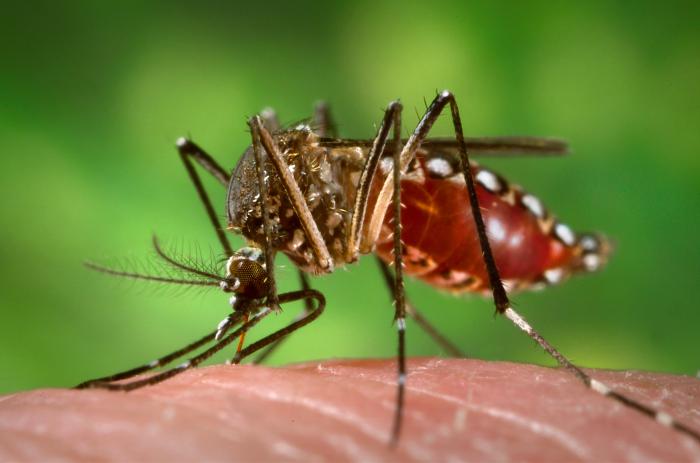 In part 1, I told you that Scott O’Neill wanted to know whether infecting Aedes aegypti mosquitos with a commensal bacteria called Wolbachia would make them resistant to the dengue virus, which they spread to tens of millions of people every year. So he and his team set out to infect A. aegypti, which don’t normally carry Wolbachia, with strains of the bacteria harvested from fruit flies. (Bear in mind that this requires getting the bacteria into the mosquitos’ abdomens without killing the mosquito. They call the technique microinjection, but that doesn’t really convey how ridiculously difficult it is.) Finally, they got it to work. And what happened? Well, it turned out that A. aegypti carrying Wolbachia are resistant to infection with dengue viruses. The mosquitos don’t live as long, and the virus doesn’t grow very well, so they carry fewer of them. When you put those two things together, the likelihood that a mosquito will pick up a dengue virus while feeding on an infected human and then transmit it to another person is doubly reduced. Introducing Wolbachia into wild mosquito populations should drastically reduce, or even eliminate, the transmission of dengue virus.
In part 1, I told you that Scott O’Neill wanted to know whether infecting Aedes aegypti mosquitos with a commensal bacteria called Wolbachia would make them resistant to the dengue virus, which they spread to tens of millions of people every year. So he and his team set out to infect A. aegypti, which don’t normally carry Wolbachia, with strains of the bacteria harvested from fruit flies. (Bear in mind that this requires getting the bacteria into the mosquitos’ abdomens without killing the mosquito. They call the technique microinjection, but that doesn’t really convey how ridiculously difficult it is.) Finally, they got it to work. And what happened? Well, it turned out that A. aegypti carrying Wolbachia are resistant to infection with dengue viruses. The mosquitos don’t live as long, and the virus doesn’t grow very well, so they carry fewer of them. When you put those two things together, the likelihood that a mosquito will pick up a dengue virus while feeding on an infected human and then transmit it to another person is doubly reduced. Introducing Wolbachia into wild mosquito populations should drastically reduce, or even eliminate, the transmission of dengue virus.
Remember, there were five reasons I loved Scott O’Neill’s talk so much. They were:
- Curiosity-driven science, however basic or obscure, can have surprisingly practical applications
- Cleverly applied scientific insights can save lives
- Knowing about evolution helps you design better eradication strategies
- Scientists can and should involve communities in risk-based decision-making
- Scientific talks can be accessible to a wide audience without compromising the science
So now we’ve covered the first two. The obscure observations of the effects of Wolbachia infection on insect reproductive fitness turned out to have a very practical application. And that application has the potential to save a lot of lives by preventing the spread of deadly viruses to humans. Now we’ll cover the other three.
- Knowing about evolution helps you design better eradication strategies
As you should know if you come to this website oft en (or, really, ever), the National Center for Science Education works hard to make sure that students learn about evolution in school. There are a million reasons why everyone should have a basic understanding of evolution, but certainly one of the most important reasons is that understanding evolution has actual, concrete, practical utility. If you understand evolution, you have a much better chance of intervening in living systems safely and effectively. Fighting disease-causing bacteria and viruses is a prime example. Humans have been fighting pests and pathogens like mosquitos, weeds, and disease-causing bacteria and viruses for a long time. Usually our approach is draconian: whether it’s antibiotics, pesticides, or even cancer drugs, our goal is to eradicate the bad guy. The problem is...wait for it...evolution! When you apply a really drastic selective pressure, you indirectly select for any organisms that are not susceptible to the treatment, be it antibiotics, pesticides, anti-virals, or whatever. And biological variation being what it is, there will always be at least some of your target organisms that are less susceptible to the treatment than others. The resistant organisms will survive the onslaught and reproduce, passing on their resistance to their offspring. Soon enough, our bad-ass drug or pesticide won’t work any more because the entire pathogen or pest population will be resistant. The beauty of the Wolbachia-infected mosquito approach is that the mosquitos aren’t being put under strong negative selection pressure. They can still feed. They can still mate. They can still reproduce. Sure, people will still get bitten by mosquitos, but they won’t get dengue. And that’s all you really care about.
en (or, really, ever), the National Center for Science Education works hard to make sure that students learn about evolution in school. There are a million reasons why everyone should have a basic understanding of evolution, but certainly one of the most important reasons is that understanding evolution has actual, concrete, practical utility. If you understand evolution, you have a much better chance of intervening in living systems safely and effectively. Fighting disease-causing bacteria and viruses is a prime example. Humans have been fighting pests and pathogens like mosquitos, weeds, and disease-causing bacteria and viruses for a long time. Usually our approach is draconian: whether it’s antibiotics, pesticides, or even cancer drugs, our goal is to eradicate the bad guy. The problem is...wait for it...evolution! When you apply a really drastic selective pressure, you indirectly select for any organisms that are not susceptible to the treatment, be it antibiotics, pesticides, anti-virals, or whatever. And biological variation being what it is, there will always be at least some of your target organisms that are less susceptible to the treatment than others. The resistant organisms will survive the onslaught and reproduce, passing on their resistance to their offspring. Soon enough, our bad-ass drug or pesticide won’t work any more because the entire pathogen or pest population will be resistant. The beauty of the Wolbachia-infected mosquito approach is that the mosquitos aren’t being put under strong negative selection pressure. They can still feed. They can still mate. They can still reproduce. Sure, people will still get bitten by mosquitos, but they won’t get dengue. And that’s all you really care about.
- Scientists can and should involve communities in risk-based decision-making
 If you haven’t asked before, it certainly makes now to ask: Are you sure it’s a good idea to transfer a bacterium from one host to another and then release the newly infected host into the wild? Doesn’t that seem a little risky? And even if the scientists come to the conclusion that it’s safe, what about the people who live in the area? Is it right to conduct this experiment without their knowledge and consent? O’Neill and his team took this responsibility very seriously. Every step of the way, local communities were alerted and told exactly what was planned. Questions were answered. Controls were put in place. Each step was undertaken only with their consent. As a result, there was community buy-in. Transparency and inclusion increased trust among the scientists, regulators and local citizens. Eventually, local citizens agreed to allow release of the infected mosquitos, and sure enough, Wolbachia infection spread through the local mosquito population. The same approach was used in other countries, where dengue virus was more widespread and, as predicted, dengue infections dropped. Click on the “Regulatory Approval and Risk Assessment” box on the left hand side of the Eliminate Dengue website to learn more.
If you haven’t asked before, it certainly makes now to ask: Are you sure it’s a good idea to transfer a bacterium from one host to another and then release the newly infected host into the wild? Doesn’t that seem a little risky? And even if the scientists come to the conclusion that it’s safe, what about the people who live in the area? Is it right to conduct this experiment without their knowledge and consent? O’Neill and his team took this responsibility very seriously. Every step of the way, local communities were alerted and told exactly what was planned. Questions were answered. Controls were put in place. Each step was undertaken only with their consent. As a result, there was community buy-in. Transparency and inclusion increased trust among the scientists, regulators and local citizens. Eventually, local citizens agreed to allow release of the infected mosquitos, and sure enough, Wolbachia infection spread through the local mosquito population. The same approach was used in other countries, where dengue virus was more widespread and, as predicted, dengue infections dropped. Click on the “Regulatory Approval and Risk Assessment” box on the left hand side of the Eliminate Dengue website to learn more.
- Scientific talks can be accessible to a wide audience without compromising the science
If you’ve read this far, maybe you didn’t take my initial advice to proceed straight to the website and watch the three minute video (did I mention the cool graphics?) that explains O’Neill’s research. Do it now. And if anybody tells you scientists can’t be both clear and accurate, well, send them to the video too.
A. aegypti photo credit: By James Gathany [Public domain], via Wikimedia Commons. Town Hall Meeting photo credit: By Redjar, CC BY-SA 2.0, https://commons.wikimedia.org/w/index.php?curid=35839262

